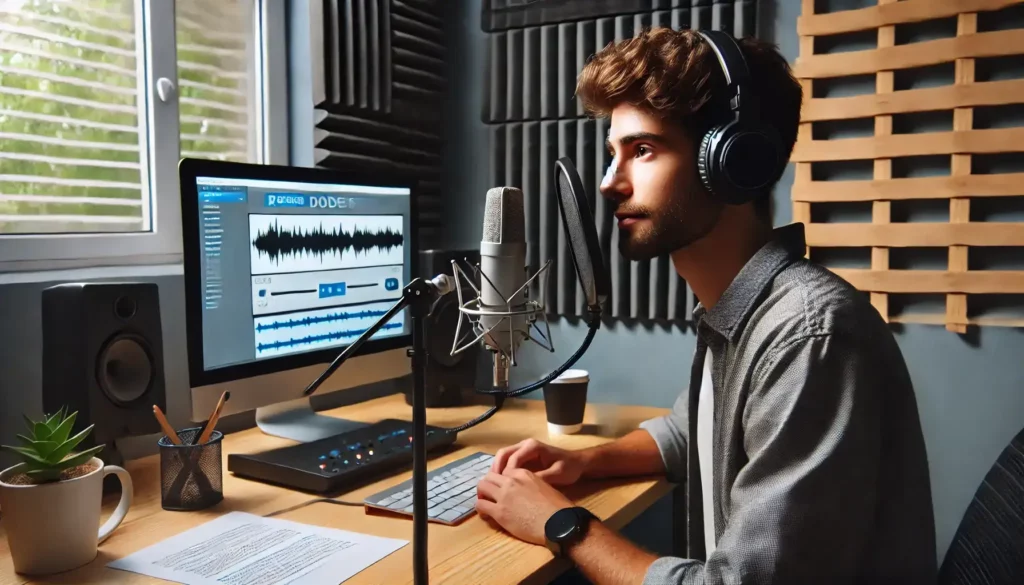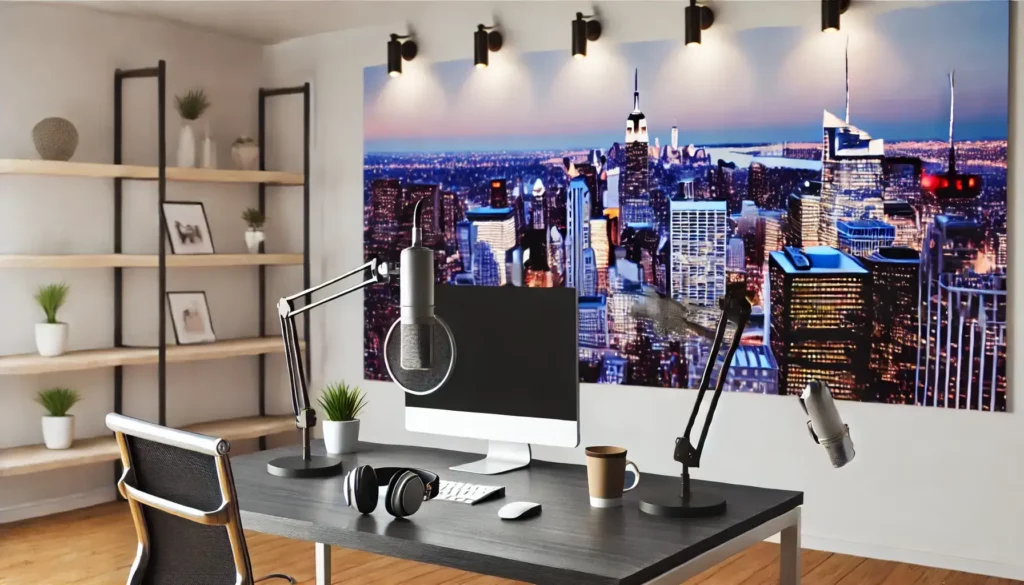Creating and monetizing your own podcast can indeed be an exciting venture. Here is a more detailed look at each step involved, including practical examples and additional tips.
1. Define Your Topic and Target Audience
Choosing a topic should be based on your interests and expertise. For instance, if you are passionate about cooking, a podcast about recipe development and cooking techniques could be interesting. Your target audience could range from beginners to seasoned home cooks. To identify your audience, you could use social media surveys or visit forums and groups related to the topic.
2. Get the Right Equipment
Good audio quality is crucial, and a good microphone is essential. A popular entry-level model is the Audio-Technica ATR2100-USB, which is affordable and user-friendly. For editing, you’ll need software like Audacity or Adobe Audition, which allow you to cut and enhance audio files. Headphones help you monitor audio quality during recording.
3. Plan and Prepare Content
Structuring your content can be achieved by creating an editorial calendar where you outline topics, interview partners, and publication dates. For example, you might plan to release an episode each week that covers a specific recipe or cooking technique. Notes and scripts for each episode help you stay on track during recording.
4. Recording and Editing
Record your podcast episodes in a quiet environment to minimize background noise. After recording, use your audio software to remove unwanted noise, improve quality, and add effects. It’s also helpful to have someone else listen to the episodes before publication to give feedback on audio quality and content.
5. Publishing and Distribution
After editing your episodes, you can upload them to platforms like Spotify, Apple Podcasts, and Google Podcasts. Use SEO-optimized descriptions to be easily found in search results. Sharing your episodes on social media and in topic-specific online communities can increase your reach.

Monetizing Your Podcast
Advertising and Sponsorship
Advertising and sponsorship are important revenue streams for many podcasters, especially if their podcast has a substantial listenership. Companies are often interested in collaborating with podcasts to promote their products or services because podcast listeners tend to be loyal and engaged.
- Advertising: Podcast advertising can take the form of ad spots, sponsored content, or mentions. These ads are typically placed before, during, or after a podcast episode and can be managed by the podcaster or an ad network. Podcasters get paid for running ads, either based on the number of listeners or a fixed fee.
- Sponsorship: Unlike traditional advertising, sponsorship deals represent a more integrated partnership between the podcaster and the company. For example, a cooking podcast could be sponsored by a kitchenware manufacturer, which not only runs ad spots but also financially supports the podcast in exchange for regular mentions. This can be a long-term collaboration providing value to both parties.
Example: A cooking podcast focused on healthy eating could be sponsored by an organic food company that is mentioned in every episode and possibly provides discount codes for listeners.
Patreon and Crowdfunding
Patreon and other crowdfunding platforms offer podcasters the opportunity to receive direct financial support from their listeners, allowing them to create a stable income stream independent of advertising or sponsorship.
- Membership Models: Podcasts can offer membership models on Patreon where listeners pay a monthly fee for exclusive content, bonus episodes, community access, or other rewards. This allows listeners to financially support the podcast while receiving additional benefits.
Example: A cooking podcast might offer exclusive recipes, cooking tips, or live Q&A sessions for paying members on Patreon.

Merchandising
Merchandising is another way for podcasters to generate additional income while increasing brand awareness. By creating and selling products with their podcast logo, quotes, or designs, podcasters can build a dedicated fan base.
- Product Range: Podcasters can offer a variety of products that fit their podcast theme, such as T-shirts, mugs, stickers, posters, or even cooking utensils.
Example: A cooking podcast might sell personalized cutting boards, aprons, or spice blends inspired by the hosts or episode themes.
Live Events and Workshops
Live events and workshops provide podcasters with an opportunity to connect personally with their audience while generating additional income. By selling tickets or entry fees, podcasters can open a new revenue stream and strengthen their brand.
- Event Types: Podcasters can organize various types of live events, such as live podcast recordings, cooking classes, meet-and-greets with the hosts, or even larger podcast festivals.
Example: A cooking podcast could organize cooking classes or tastings where listeners can try the recipes from the episodes and interact with the hosts.
Overall, advertising, sponsorship, Patreon, merchandising, and live events offer podcasters various ways to monetize their work while deepening their relationship with their audience. Combining different revenue sources can help create a stable and sustainable income.

Popular Podcast Topics in the USA
The popularity of podcast topics can vary greatly depending on the target audience and current trends. However, some topics are often in demand and have a broad listenership. Here are some examples:
- True Crime: True crime podcasts, which focus on real criminal cases, have been extremely popular for years. They offer captivating stories and allow listeners to delve into the world of investigations.
- Interviews and Conversations: Podcasts featuring interviews with interesting personalities or experts are also highly sought after. These can cover various topics, from entrepreneurship to personal development, politics, and culture.
- Health and Wellness: Podcasts focusing on topics like fitness, nutrition, mental health, and holistic wellness are gaining popularity as many people seek information to lead healthier lives.
- History: History podcasts, which cover historical events, personalities, and eras, often attract a broad audience. They offer an entertaining way to learn more about the past and understand connections.
- Technology and Science: Podcasts dealing with current developments in technology, science, and innovation are particularly attractive to tech-savvy listeners. They provide insights into new technologies, scientific discoveries, and future trends.
- Self-Improvement and Personal Development: Podcasts offering tips, advice, and stories on self-improvement, personal development, productivity, and motivation are popular among people looking for inspiration and practical advice to improve their lives.
- Pop Culture and Entertainment: Podcasts covering current events in pop culture, film, television, music, literature, and art are popular among a broad audience that wants to stay updated on trends and news in the entertainment industry.
It’s important to note that a podcast’s success depends not only on the chosen topic but also on the quality of content, presentation, and consistency. The best podcasts often offer a unique perspective, in-depth research, and engaging presentation to captivate and retain their audience.
Successful Podcasters in the USA
The world of podcasts is rich with talent and personalities who have built large audiences and significant influence in their respective niches. Success in the podcast world can be defined in various ways, be it through high listener numbers, financial success, cultural impact, or a combination thereof. Here are some examples of successful podcasters:
Joe Rogan Experience (Joe Rogan)
Joe Rogan is arguably one of the most well-known and influential podcasters. His podcast, “The Joe Rogan Experience,” is known for its long-format interviews with guests from various fields like comedy, sports, science, and culture. Rogan has built an immense audience and a strong cultural presence, leading to a $100 million deal with Spotify.
The Daily (The New York Times)
“The Daily” is a podcast by The New York Times that presents daily news, background stories, and interviews. Hosted by Michael Barbaro, it offers deep insights into current events and complex topics. “The Daily” has a loyal listenership and has won several awards, including the prestigious Peabody Award.
Serial (Sarah Koenig)
“Serial” is a groundbreaking podcast released in 2014 and hosted by Sarah Koenig. The first season of “Serial” investigated the case of incarcerated Adnan Syed and sparked a wave of interest in true-crime podcasts. The series has won numerous awards and played a significant role in popularizing podcasts.
Crime Junkie (Ashley Flowers and Brit Prawat)
“Crime Junkie” is a true-crime podcast hosted by Ashley Flowers and Brit Prawat. The show presents detailed and gripping stories about real crimes and has built a huge fan base. “Crime Junkie” regularly tops podcast charts and has spawned a variety of live shows and merchandise.
Radiolab (Jad Abumrad and Robert Krulwich)
“Radiolab” is an award-winning podcast hosted by Jad Abumrad and Robert Krulwich. The show explores complex topics from science, philosophy, and society and presents them in a captivating and innovative way. “Radiolab” has a loyal listenership and has been praised for its unique storytelling and production techniques.
This list is just a small snapshot of the diversity and richness of the podcast landscape. Success in podcasting can be measured in many ways, and there are countless talented podcasters doing outstanding work in their respective genres.

Publishing a Podcast and Creating Engaging Content
Publishing a podcast and generating engaging content are two important aspects for aspiring podcasters. Here is a detailed look at both points:
Publishing a Podcast
- Choose a Hosting Platform: There are various hosting platforms for podcasts, including Podbean, Libsyn, Anchor, and Buzzsprout. These platforms provide storage space for your audio files, generate RSS feeds, and distribute your episodes across various podcast directories.
- Create Cover Art and Descriptions: Design an appealing cover image for your podcast and write an informative description that informs potential listeners about the content and style of your podcast. This helps attract potential listeners.
- Upload Your Episodes: Once you have produced and edited your episodes, upload them to your hosting platform. Make sure to carefully manage the metadata for each episode, such as title, description, and tags, to improve discoverability.
- Promote Your Podcast: Share your episodes on various platforms and social media to increase your reach. Place links to your podcast on your website or in your email signature to attract potential listeners.
Creating Engaging Content
- Identify Your Audience: Consider who your target audience is and what topics might interest them. Conduct surveys, analyze listener feedback, and research trends in your niche to create relevant content.
- Brainstorming and Planning: Regularly sit down with your team or alone to gather ideas for upcoming episodes. Brainstorming sessions, mind maps, and lists can help generate creative and diverse ideas.
- Research and Expertise: Invest time in researching the topics you want to cover. Look for current studies, interviews with experts, and relevant news to make your content well-founded and up-to-date.
- Interviews and Guest Contributions: Invite experts, thought leaders, and personalities from your industry to appear as guests on your podcast. Their insights and experiences can offer valuable knowledge to your listeners and strengthen your credibility.
- Experiment with Formats: Try different formats and styles to bring variety to your episodes. These can be interviews, solo episodes, storytelling, discussions, or listener questions.
By regularly updating your content, responding to feedback, and keeping an eye on current trends, you can ensure that your podcast remains engaging and relevant.
SecretJobs is a great platform for exciting requests and potential partnerships. Here, companies and freelancers can collaborate confidentially and realize innovative projects. If you are looking for ways to expand your podcast or enter into new partnerships, SecretJobs might be just what you need.































